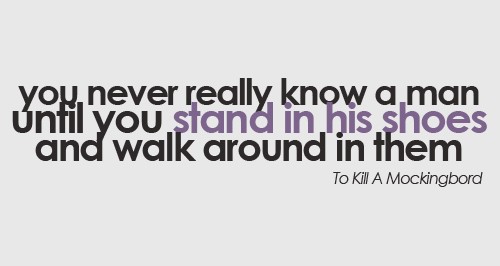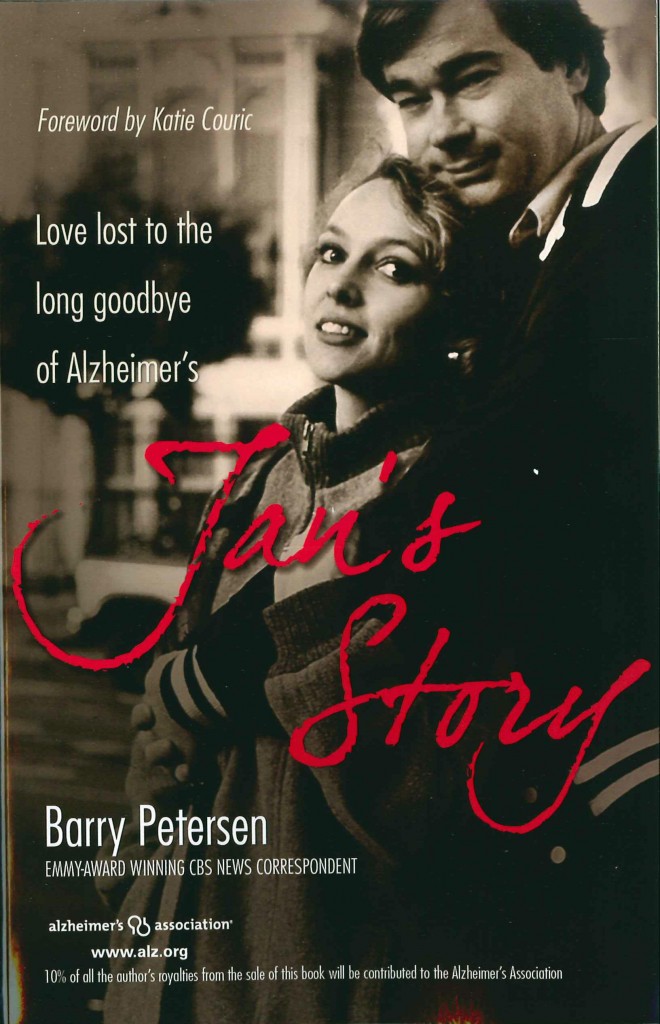Journey Mercies . . . Alzheimers: Walking Into Oblivion
Journey Mercies . . . Alzheimers: Walking Into Oblivion
In her book To Kill a Mockingbird, Harper Lee beautifully wrote . . .
I found this to be the case as I learned more about Barry Petersen.
November is National Alzheimer Awareness Month and our Blog Coordinator, Molly Keating, asked me if I would take the opportunity to write something that we could share to help bring more awareness to this insidious disease. Other than those who were famous and who were willing to share their fate, (President Ronald Reagan, Charlton Heston, and most recently, Glen Campbell) my only connection with Alzheimer’s is with two very close friends, a girlfriend whose mother was diagnosed, and a fellow Rotarian whose wife was diagnosed. Both have expressed their love and devotion, as well as their concern for their care. In conversations with them I have asked naïve, simple questions as I didn’t want them to feel as if I was prying but I also didn’t really know what to ask because I didn’t have any deep knowledge of their situation.
I remember seeing a story several years ago that was shown on the CBS News program “Sunday Morning”, with Charles Osgood. It was a short story told by news reporter Barry Peterson who’s poignant and heart-wrenching account brought tears to my eyes. (You can watch the video I saw here)
Jan Chorlton was a beautiful, vivacious, smart news reporter and Barry Peterson fell head over heels for her. After going through a very tough divorce he never expected to find anyone with her charisma, much less her looks. They fell in love, married in 1985 and . . . of course you would always end that sentence with “and they lived happily every after,” right? Nothing could have been further from the truth. In Barry Peterson’s book Jan’s Story, he describes a love lost to a diagnosis of Early Onset Alzheimer’s Disease. Most people think of Alzheimer’s as a disease of the old. His wife, Jan, was diagnosed in 2005 at the age of 55. His book chronicles their journey into the abyss of Alzheimer’s Disease.
Via amazon.com
In this incredible book his pain is palpable as he describes in detail Jan’s decent into that dark hole. He confesses to spending years denying that anything was wrong. Chronicling the “Seven Stages of Alzheimer’s Disease,” Barry reveals all of the sadness, anger, guilt, exhaustion and helplessness he felt and still feels as he watches the love of his life continue to change before him. The first stage entitled, Walking Into Oblivion: Stage One, reads: No impairment (normal function). Unimpaired individuals experience no memory problems and none are evident to a healthcare professional during a medical interview. As Barry put it, “it seems strange that the first Stage of Alzheimer’s is about showing no obvious symptoms. The answer lies within the disease, an answer that offers the additional terror that Alzheimer’s is already at work before a person knows it.”
After reading Jan’s Story I have been realizing how much I didn’t know, how much I couldn’t or didn’t want to believe what The Disease does, and how utterly terrifying it is. In the past I have attended and supported the Visionary Women’s luncheon, where each year the Women’s Circle of the Alzheimer’s Association honors Orange County caregivers who display extraordinary compassion in caring for those touched by Alzheimer’s disease and related forms of dementia. And, I know of the great educational programs the Orange County Chapter of the Alzheimer’s Association provide to our community, family and private caregivers, and professionals who care for Alzheimer patients. But I had never taken the time to really peel back the layers of The Disease and read a first hand account from one who is walking, running, fleeing from that which will destroy the life of the one suffering from it as well as the lives of those caring for them. Families agonize and relationships dissolve.
Barry Peterson offers the reader a personal tour of not only Jan’s descent, but his as well. He reveals how each and every day he loses a little more of Jan in mind and spirit . . . even while her body was still beautifully alive. His honesty reveals how difficult it was to find others who were caregivers that were willing to meet and create a safe place to speak freely. He brings to life the exhaustion of care-giving, and his immense loneliness. With amazing courage he exposes his own thoughts of suicide, the grief of love lost, and the rejection of his friends as he is judged to be “abandoning” Jan for eventually placing her in a home. He takes you to the brink and gives you the opportunity to make up your own mind about what you would do in his shoes. Decisions that meant he could survive another day.
It is a story of undeniable and enduring love – but a love of one dimension. A love that, destroyed by The Disease, provided no reciprocation. A love that was meant to live forever and which day by day faded into nothingness. It’s a story of a man who traveled a road alone, endured, and found renewal. Barry Peterson chose life.
If you haven’t had the opportunity to take an in-depth look at Alzheimer’s Disease and know and understand the insidious sinister way that it takes away all memory and leaves only the shell of what use to be, please pick up a copy of Jan’s Story or read Still Alice by Lisa Genova. Still Alice is a fictional account of Alice Howland, Cognitive Psychology Professor at Harvard University, who at 50 years old was diagnosed with Early Onset Alzheimer’s Disease.
None of us are certain what our future holds. Barry certainly imagined differently. What I know for sure is not to stand in judgment of others, especially when we don’t want to imagine what it would be like to walk in their shoes. I’ve learned so much from the courageous authors, Barry Peterson and Lisa Genova. I’ve learned that there are some things that we have no control over, and some things we do. I will choose knowledge and understanding that leads to compassion. I will choose life.






39 Comments
Amy
It’s inspiring to think that you and others are opening their heart and their minds and sharing their stories about how it has affected them, or that they never realized what others are going through. We all want to think that it will never happen to us or for that matter, we never think about it at all. We need to be thinking about it and learning more about it because the chances that it will effect one of our own if compelling.
Thank you for your comments . . I appreciate you.
Pat
Hi Pat –
You have become a great researcher, writer & blogger. This is a very touching story, that breaks my heart. The lessons of not not judging anyone, even if you have walked in their shoes. The unpredictability of life’s journey is so unknown. Compassion is the best quality we could offer each other. Thank you for sharing this story with us.
Neil
This piece has really touched me. As you and I shout from the rooftops to anyone who will listen, it’s education that creates awareness. I was sympathetic to The Disease, but uneducated about it’s power to destroy lives. Barry Peterson put a name and a face on it – and made me realize that it’s so much more than the sum of it’s name. It’s hideous.
You said it best . . compassion.
Pat
Dear Pat,
Beautifully written! I saw the same program as you and my response was unlike yours. My father-in-law was diagnosed with Alzheimers before the noterity of this disease reached the heights it claims in today’s society.
My empathy goes out to the families of these individuals for the courage necessary to deal with Alzheimers on a daily basis.
Thank you for your beautiful blog.
Mary D.
Hi Mary:
Thank you so much for your comments. For me, it was a very emotional piece. Digging deep and understanding better the realities of it gave me the ability to be compassionate and supportive of those I know who are walking the long, never ending journey. It’s true when the call this Disease the Long Goodbye. Or as Barry Peterson said, “It’s like going to the same funeral over and over again.”
Pat
Pat,
I am reminded of just how much of life I simply know nothing about when reading your latest offering. There are many “insidious” circumstances in life. Losses of this kind where the person is altered right before your eyes into someone you could never have imagined or rather the absence of the person that you can still stand and sit with though that person is not there. Wow! It is hard to understand or imagine. I remember the alteration in my father after he had a brain tumor removed. The inability to use the trackpad on his computer, confusion and other minor inabilities that began to become apparent were so hard to reconcile when man still stood before you in full form and “normal” physical presence. It is hard to accept. It is hard to not get frustrated with them when they look like they should be able.
I regret the frustrations I felt and occasionally expressed. Ashamed that I could not be more compassionate and understanding. This was a short season of just 5 or 6 months. I cannot fathom the year after year and progressive incremental decline. I do not want to ever experience what Barry has had to go through. Who would right? I am thankful for the perspective and understanding that Barry and others who are willing to share their struggles are willing to share. This is a very touching and provoking story.
Blessings to you for reading the book and sharing it with us.
Jeff
Jeff:
Your comments are heartfelt and open. Interestingly enough, as I have spoken to my various colleagues and friends about this blog, I have heard stories much like yours. The anger and frustration that most all of the caregivers feel at one time is real and palpable. That comes with the emotional and physical depletion of their human resources, and their ability to cope with someone who cannot function the way they once did.
Thank you for your honesty and your willingness to share this with others. It’s so important to put this out there, talk about it, and support one another. Barry needed that and had to search to find it.
I so appreciate you and the depth of your response.
Love,
Pat
Pat, this is a very moving blog- thank you for shining a light on this mysterious disease. Oftentimes, we don’t understand the disease from the viewpoint of the loved ones & this is a wonderful portrayal of just that. Thank you so much! Carrie
Hi Carrie
You are absolutely right. Education, as you well know, provides us with great insight and depth into whatever it is we are learning about. It gives us the tools to provide even better care. This Disease renders families nearly helpless as they navigate the care of their loved one. The Alzheimer’s Association provides incredible resources to families who have just been diagnosed, as well as to the community, the professionals, and the lay volunteers and outside caregivers. It’s amazing what they do to inform.
Thank you,
Pat